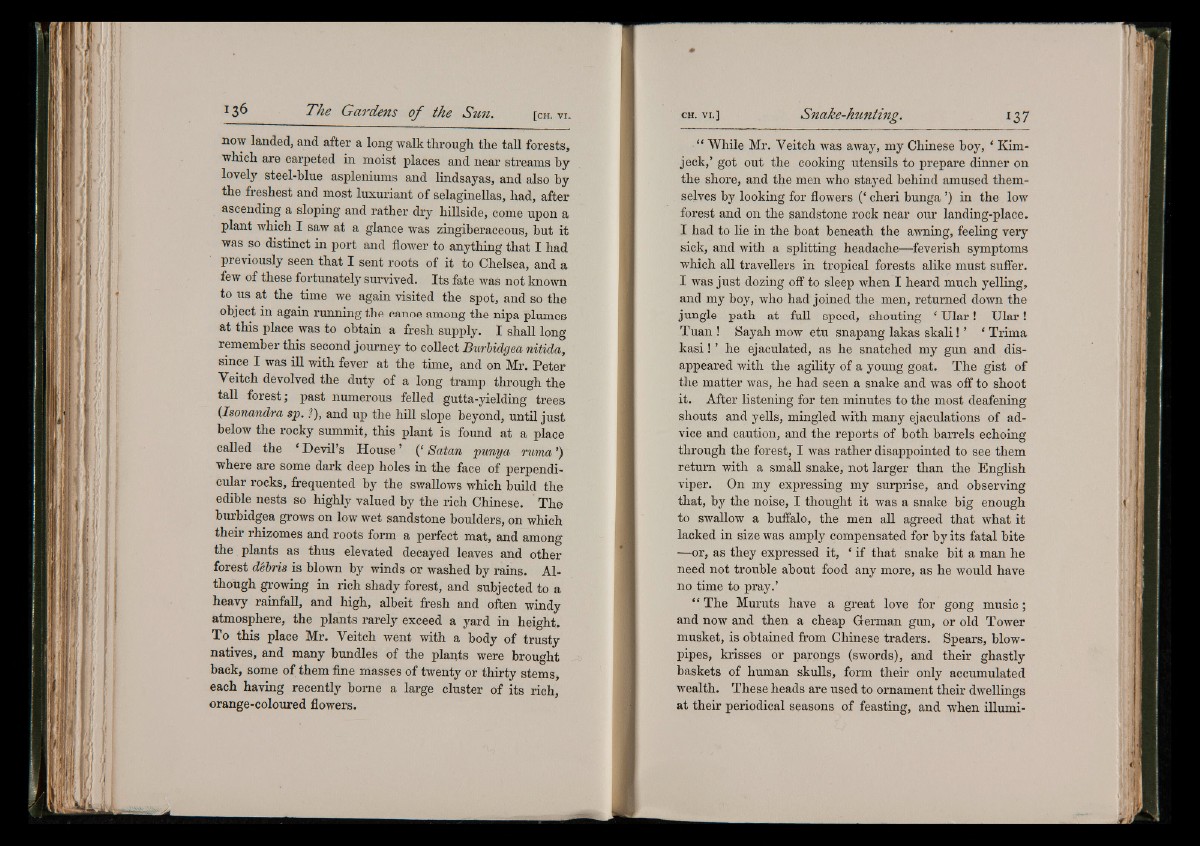
now landed, and after a long walk through the tall forests,
which are carpeted in moist places and near streams by
lovely steel-blue aspleniums and lindsayas, and also by
the freshest and most luxuriant of selaginellas, had, after
ascending a sloping and rather dry hillside, come upon a
plant which I saw at a glance was zingiberaceous, hut it
was so distinct in port and flower to anything that I had
previously seen that I sent roots of it to Chelsea, and a
few of these fortunately survived. Its fate was not known
to us at the time we again visited the spot, and so the
object in again running the canoe among the nipa plumes
at this place was to obtain a fresh supply. I shall long
remember this second journey to collect Burbidgea nitida,
since I was ill with fever at the time, and on Mr. Peter
Veitch devolved the duty of a long tramp through the
tall forest; past numerous felled gutta-yielding trees
(Isonandra sp. ?), and up the hill slope beyond, until just
below the rocky summit, this plant is found at a place
called the * Devil’s House ’ (‘ Satan punya rwma ’)
where are some dark deep holes in the face of perpendicular
rocks, frequented by the swallows which build the
edible nests so highly valued by the rich Chinese. The
burbidgea grows on low wet sandstone boulders, on which
their rhizomes and roots form a perfect mat, and among
the plants as thus elevated decayed leaves and other
forest débris is blown by winds or washed by rains. Although
growing in rich shady forest, and subjected to a
heavy rainfall, and high, albeit fresh and often windy
atmosphere, the plants rarely exceed a yard in height.
To this place Mr. Veitch went with a body of trusty
natives, and many bundles of the plants were brought
back, some of them fine masses of twenty or thirty stems
each having recently borne a large cluster of its rich,
orange-coloured flowers.
“ While Mr. Veitch was away, my Chinese boy, * Kim-
jeck,’ got out the cooking utensils to prepare dinner on
the shore, and the men who stayed behind amused themselves
by looking for flowers (£ cheri bunga ’) in the low
forest and on the sandstone rock near our landing-place.
I had to he in the boat beneath the awning, feeling very
sick, and with a splitting headache—feverish symptoms
which all travellers in tropical forests alike must suffer.
I was just dozing off to sleep when I heard much yelling,
and my boy, who had joined the men, returned down the
jungle path at full speed, shouting | U lar! U lar!
Tuan ! Sayah mow etu snapang lakas skali! ’ * Trima
k a si! ’ he ejaculated, as he snatched my gun and disappeared
with the agility of a young goat. The gist of
the matter was, he had seen a snake and was off to shoot
it. After listening for ten minutes to the most deafening
shouts and yells, mingled with many ejaculations of advice
and caution, and the reports of both barrels echoing
through the forest, I was rather disappointed to see them
return with a small snake, not larger than the English
viper. On my expressing my surprise, and observing
that, by the noise, I thought it was a snake big enough
to swallow a buffalo, the men all agreed that what it
lacked in size was amply compensated for by its fatal bite
—or, as they expressed it, ‘ if that snake bit a man he
need not trouble about food any more, as he would have
no time to pray.’
“ The Muruts have a great love for gong music;
and now and then a cheap German gun, or old Tower
musket, is obtained from Chinese traders. Spears, blowpipes,
krisses or parongs (swords), and their ghastly
baskets of human skulls, form their only accumulated
wealth. These heads are used to ornament their dwellings
at their periodical seasons of feasting, and when illumi